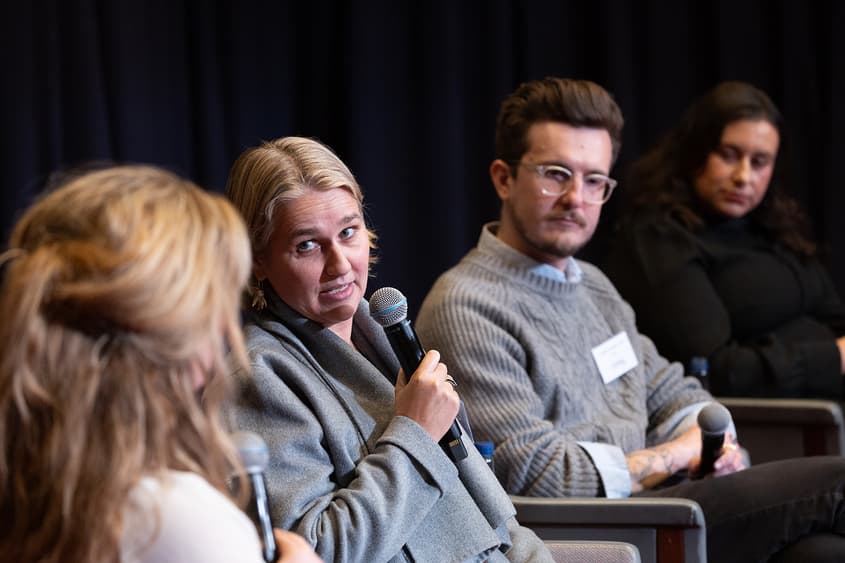The Government spends an estimated $13 to 15 billion per year on housing, it's all directed to the capital gains tax discount, the negative gearing deductions and the Commonwealth rent assistance.
Fri 31 Oct 2025 00.00

Photograph by Mike Bowers
Housing advocates are tired of hearing people complain “the Government isn’t doing anything on housing”, arguing it’s taking action, just not what’s needed.
National spokesperson for the Everybody’s Home housing campaign, Maiy Azize said it’s one of her “pet peeves”.
“The Government is taking a lot of action,” she told the Australia Institute’s Revenue Summit, “it’s just taking exactly the wrong kind of action.”
“They are doing heaps and heaps and heaps,” agreed Jordan van den Lamb, known by his online alias PurplePingers. “It’s just all terrible.”
Taking part in the summit’s ‘Housing & Tax Reform: Building a Fairer Future’ panel discussion, Ms Azize said the Government “spends an enormous amount of money on housing” estimating it to be around $13 to $15 billion a year “depending on when you look at it”.
“It’s the capital gains tax discount, it’ the negative gearing deductions and it’s the Commonwealth rent assistance,” she said.
Ms Azize said both State and Federal Governments need to look back to the 1950s – when housing was most affordable – to find solutions that prevent the crisis from worsening.
“At the high point, in 1956, about 1 in 4 new builds in Australia was being built by the government.”
She said one in three renters lived in public housing until the early 1980s when policy flipped to subsidies for investors.
“There is not a country in the world that has fixed the housing crisis without the government playing a major role in housing supply,” she said.
Oxfam’s Josie Lee urged Canberra to stop the economic divides from deepening by introducing a wealth tax.
“We’re giving a lot of concessions and tax breaks that disproportionately benefit people on the highest incomes”.
“Firstly, 85% of the benefit of the capital gains tax discount goes to the wealthiest 10% of people.
“So, this is a tax discount that is really driving inequality.”
Chief Political Analyst at the Australia Institute and panel chair, Amy Remeikis voiced concern about “the increase in generational inequality and the damage that we are doing to the fabric of our society by not actually having homes for everyone.”
“Allowing people to continue accumulating millions and millions of dollars in wealth while people are homeless does not sit at all well with me in what is one of the wealthiest countries in the world.”
Josie Lee said, “if we really want to tackle the growing inequality problem in Australia, but also the housing problem, scrapping capital gains tax discount would be a critical place to start.
“If the Government did that last year, they would have saved about $22 billion.
“So, it’s a winner.”
Advocate Jordan van den Lamb accused politicians of prioritising self-interest over meaningful policy change.
“There is an element of it that is, I’m scared of how if I actually do anything substantive to address the housing crisis … and I will lose votes.
“I think that is a genuine concern for them.
“Meanwhile people are dying.”
Oxfam’s Josie Lee said there’s been a “huge growth in extreme wealth” over the past decade and “the number of billionaires in Australia has grown from about 74 to 161 … and the top 200 people in Australia have $670 billion together.”
She cited an estimate by French economist Gabriel Zucman that taxes paid by billionaires represent only around 0.3% of their wealth.
“So, they are notorious tax avoiders.”
“If we applied a 5% wealth tax to just billionaires in Australia … we could raise around $33 billion.”
“It could virtually eradicate poverty … we do not have to have poverty in Australia.”
“Not only should we not give people, who rely on building their own wealth by exploiting others, tax concessions,” agreed Mr van den Lam, “we should be taxing them punitively like heaps and heaps and heaps more because it’s evil”.
Research from the Australia Institute shows closing tax loopholes on wealth will make housing more affordable and reduce wealth inequality.
It has also debunked the myth that migration is behind soaring house prices, with Ms Remeikis pointing out that “over the last ten years, population in Australia has increased by 16% and housing stock has increased by 19%.”
Mr van den Lamb told the summit he’d witnessed some “disgusting” behaviour towards migrants in Melbourne because of the misinformation. “We’re doing the same thing that we’ve always done throughout history which is blame someone who doesn’t look like you for the evils of the rich in this country.”
The social media activist floated the idea of reestablishing a government-owned bank so it could buy back owner-occupier mortgages from the big four banks to help reduce mortgage costs and housing prices.
“I think we absolutely need a national bank.”
He also pointed out that state governments often claim they can’t act on housing because of limited funding yet remain “addicted” to stamp duty.
Ms Lee said stamp duty also plays a role in the housing crisis because it’s a barrier to people downsizing and “the case for reforming stamp duty is very strong”.